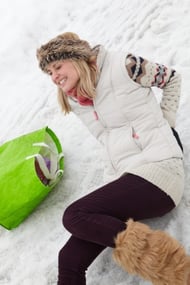Scura, Wigfield, Heyer, Stevens & Cammarota Blog
- Blog
Standard of Care for Business Owners in a Slip and Fall Accident
 Snow is certainly a common feature in New Jersey during the winter months. And while residents are used to encountering snow and ice in their daily commute, these could pose serious risks to individuals. If business owners do not take proper care to address the dangers caused by snow and ice accumulation during the winter months, a serious slip and fall accident could occur.
Snow is certainly a common feature in New Jersey during the winter months. And while residents are used to encountering snow and ice in their daily commute, these could pose serious risks to individuals. If business owners do not take proper care to address the dangers caused by snow and ice accumulation during the winter months, a serious slip and fall accident could occur.
What standards apply to business owners regarding snow and ice removal? In general, there are three legal standards that could be used in a slip and fall incident to determine whether or not the business owner or property owner met the reasonable care standard in that situation. The standard that applies is dependent on the jurisdiction.
Three Legal Standards for Businesses & Slip and Fall Accidents
First, there is the "natural accumulation rule," which states that the business owner does not create the snow and ice and these are not defective property conditions. Therefore, the business owner does not have the responsibility to remove the snow and ice from the property and is not liable from the injuries caused by its presence. However, there is an exception to this rule if enough time has passed, causing snow to be compacted to ice. Additionally, actions such as salting, shoveling and plowing do not impose liability on the business owner.
The second standard is the "storm-in-progress rule." This mandates that a business owner is responsible for snow or ice removal only after a reasonable time after the end of the storm. A reasonable care standard is used to determine this amount of time, and in cases of a slip and fall injury, it must also be determined if the victim was injured from snow or ice from a previous storm or a current storm.
Finally, the "reasonable care rule" could be used. This rule simply states that the business owner must exercise reasonable care at all times when addressing snow and ice on the business premises. With this rule, snow and ice are treated like any other type of spill on a business premises, and if a business owner could anticipate a possible injury, he or she should act reasonably to prevent such an injury.
Understand Your Slip and Fall Situation
Because local and state regulations determine which standard applies in a slip and fall accident, those harmed in such an accident should take the time to fully understand their situation. A premises liability suit could help an injured party hold a negligent business owner responsible for failing to meet this standard of care, helping them pursue compensation for their losses and damages.
If you have been injured in a slip and fall and need help figuring out if you have a legal claim for compensation, contact the personal injury attorneys at Scura, Wigfield, Heyer & Stevens, LLP today for a free consultation.
Share Article
Need Help? Contact Us Today!




Lists by Topic
- Bankruptcy (310)
- Personal Injury (89)
- Chapter 13 (50)
- Chapter 7 (50)
- Debt Management (50)
- Foreclosure (47)
- Accident (28)
- Car Accident (25)
- Chapter 11 (24)
- Business Bankruptcy (19)
- Credit (18)
- Insurance Claims (16)
- Business Law (11)
- Employment Law (11)
- Litigation (11)
- Probate and Estate Law (11)
- Attorney (10)
- Consumer Bankruptcy (10)
- Damages (10)
- Medical (10)
- Product Liability (10)
- Divorce (8)
- Workers Compensation (8)
- Slip and Fall (6)
- Commercial & Residential Real Estate (5)
- Premises Liability (5)
- Repossession (5)
- wrongful death (5)
- Contracts (4)
- Family Law (4)
- Video | Bankruptcy (4)
- Bankruptcy Cost (3)
- Corporate Litigation (3)
- Trial Law (2)
- student loans (2)
- tax (2)
- Attorney Fees (1)
- COVID-19 (1)
- Certified Civil Trial (1)
- Custody (1)
- Dog (1)
- Dog Bites (1)
- News (1)
- Relocation Assistance (1)


